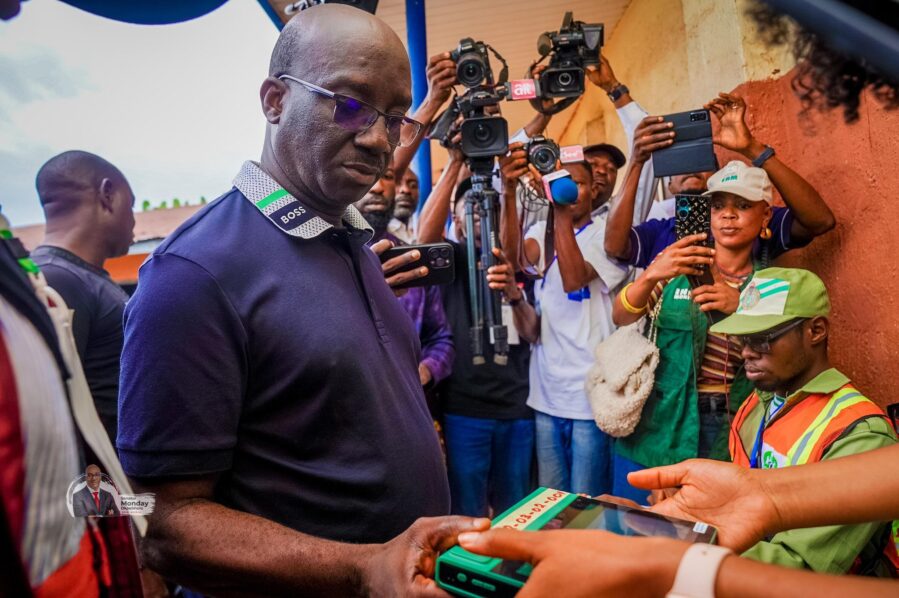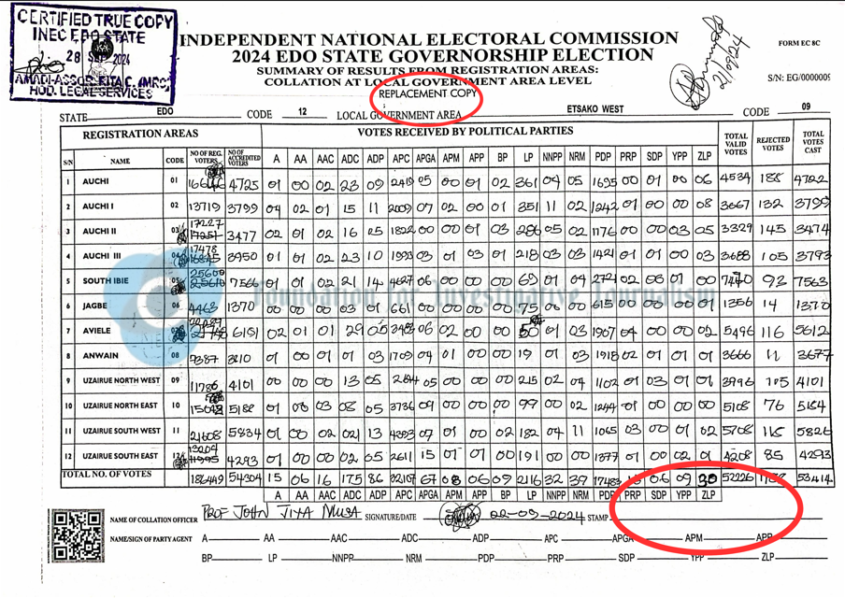
An investigative report by the Foundation for Investigative Journalism (FIJ) has raised grave allegations of electoral malpractice during the Edo State governorship election held on 21 September 2024. The report accuses the All Progressives Congress (APC), in collaboration with officials from the Independent National Electoral Commission (INEC) and security agencies, of orchestrating a rigging scheme that secured victory for APC candidate Monday Okpebholo.
According to the FIJ, the election was marred by irregularities, including voter suppression, electoral violence, and the falsification of results. These allegations are particularly significant in Etsako West Local Government Area, a stronghold of former governor and APC leader Senator Adams Oshiomhole. In this LGA, the APC was declared to have won 32,107 votes against the Peoples Democratic Party (PDP)’s 17,483 votes.
READ MORE: Edo election: EFCC arrest vote buyers
However, the investigation reveals that the Certified True Copy (CTC) of the results obtained by the PDP was labelled as a “Replacement Copy” and lacked INEC’s official stamp, which was present on similar documents from other LGAs. The collation process at the Auchi Council Hall was further disrupted by gunfire in the early hours of 22 September. During the incident, the deputy chairman of the local government, Benji Ojietu, was shot and alleged that the police were responsible for the attack, which led to the loss of key electoral documents.

The report also implicates prominent APC figures in electoral malpractice. Dennis Idahosa, now the deputy governor of Edo State, is accused of coordinating voter suppression in PDP strongholds and influencing INEC officials to alter results during collation. Nosa Adams, an APC leader from Egor Local Government, allegedly played a similar role in manipulating election outcomes. Both men are said to have exploited their political clout to undermine the election’s credibility.
READ MORE: Defamation: Babalola drops charges against Farotimi after Ooni, Ewi, other monarchs’ plea
FIJ’s findings cast serious doubt on INEC’s adherence to the Electoral Act, particularly regarding the use of the Bimodal Voter Accreditation System (BVAS). Despite its mandated use for electronic transmission of results, the report alleges that many polling units resorted to manual collation, creating opportunities for result manipulation. Furthermore, INEC has been accused of withholding critical election materials, despite court orders mandating their release, frustrating the PDP’s legal challenge of the results.
The investigation highlights irregularities beyond Etsako West. In Ikpoba Okha’s Oregbeni ward, results were inexplicably cancelled, despite the accreditation of 10,928 voters. Across Edo State, reports of over-voting—where the total votes cast exceeded the number of accredited voters—further question the validity of the declared results. The report also alleges that violence was deployed strategically in PDP strongholds, with armed thugs intimidating voters, disrupting polling units, and snatching ballot boxes, often with the tacit approval of security personnel.
The PDP’s governorship candidate, Asue Ighodalo, described the election as “…the worst elections in the history of this country,” accusing INEC and the police of colluding with the APC to rig the outcome. The PDP has since filed a petition contesting the results, citing widespread irregularities and non-compliance with the Electoral Act. The FIJ report appears to bolster these claims, offering evidence of systemic failings that undermined the election’s integrity.
The FIJ’s revelations have reignited concerns about the impartiality of INEC and the complicity of security agencies in Nigeria’s electoral process. Observers warn that failure to address these issues could erode public trust in the country’s democratic institutions and set a troubling precedent for future elections.
As the legal battle over the Edo election continues, the FIJ’s findings provide critical insight into what may become a defining test of Nigeria’s commitment to free, fair, and credible elections.



![[FILES] A picture shows the Argentinian flag. (Photo by DANIEL LEAL-OLIVAS / AFP)](https://cdn.guardian.ng/wp-content/uploads/2020/11/Argentina-.jpg)


